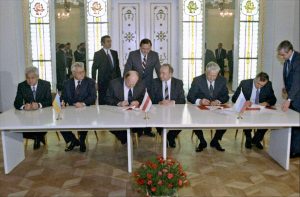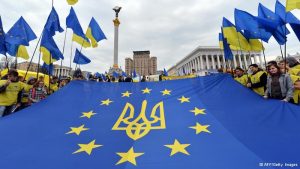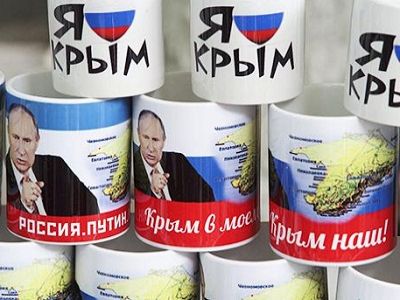In the past six months, the world has seen some amazing political activity in Ukraine. We watch and take part... sometimes without even realizing it, experiencing not only thrills and deep emotions, but also swaying from despair to triumph, from admiration to anger.
Many uninvolved observers see Maidan as some kind of local Ukrainian revolution or people’s revolt… a revolt against kleptocrats, or to say it simply - petty criminals. In fact, the quiet and gentle Ukrainian people could no longer bear such contempt and outrage and rebelled. They rebelled spontaneously, the only way they knew. That is how some people like to portray what happened on Maidan Nezalezhnosti (Independence Square) in Kyiv and all over Ukraine.
However, this event is much more important. Putin’s Russia and the annexation of Crimea, the threat of large-scale war between Russia and Ukraine, and Russia’s confrontation with the whole world are part of a much wider series of events, in which Maidan constituted a mere “foundation stone”. It exploded, and the entire world order, which had been neatly arranged at the Yalta Conference in 1945, collapsed almost overnight.
In international legal terms, the main thing that the Yalta Conference and similar international conferences signified is that “agreements are to be kept” - pacta sunt servanda.
Such global diplomatic congresses usually occur after a geopolitical catastrophe.
In the nineteenth century, the collapse of Napoleon’s empire brought about a “catastrophe” for monarchical Europe. After the Battle of Waterloo, the Congress of Vienna in 1815 laid the foundations for Europe’s social and political structure - pacta sunt servanda.
The First and Second World Wars constitute the most important geopolitical catastrophes in the twentieth century. After the First World War, political leaders signed a number of agreements that shaped the world for two decades - pacta sunt servanda.
In 1919, the Allies concluded the Treaty of Versailles with the Hohenzollern Empire. Germany lost a number of regions, such as Alsace and Lorraine (ceded to France) and German New Guinea (ceded to Australia, and the Samoa Islands (ceded to New Zealand). I mention these historical curiosities so that readers may understand how the shot in Sarajevo echoed across almost every continent, even in distant Samoa.
However, the world order continued to shift and change.
The Treaty of Saint-Germain-en-Laye in 1919 declared the dissolution of the Austro-Hungarian Empire and the creation of several countries – the Republic of Austria, Hungary, Czechoslovakia, Poland, and the Kingdom of Serbs, Croats and Slovenes. The West Ukrainian People’s Republic was proclaimed on November 1, 1918.
The Treaty of Neuilly-sur-Seine in 1919 required Bulgaria to cede several territories.
The final borders of Hungary were decided by the Treaty of Trianon in 1920 – Transylvania and eastern Banat were ceded; Croatia, Bachka and western Banat became part of the Kingdom of Serbs, Croats and Slovenes; Slovakia and Transcarpathian Ruthenia (Ukraine) were incorporated into Czechoslovakia.
The Treaty of Sèvres in 1920 ended the Ottoman Empire - Türkiye was also dismembered.
Of course, many were dissatisfied…from Germany to Hungary. De facto, the First World War did not end. It took root in the minds of people and nations, and eventually led to revisionist movements throughout Europe.
However, the principle of pacta sunt servanda survived for almost two decades in interwar Europe.
World War II was a continuation of World War I. Not only was it a revanchist attempt to return everything to its former state, but to impose a “New Order” in Europe, i.e. new relations and solutions, but from a position of strength. Any agreements or treaties were openly and demonstratively rejected. The very principle of pacta sunt servanda
was denied. I draw special attention to Hitler’s demands that the capitulation of France take place in the same railroad car where twenty-two years earlier the Germans had signed the Armistice ending World War I. Theatricals… politics of signs and symbols.
Russian President Vladimir Putin also made use of symbols and signs when he proclaimed the annexation of Crimea… acting as “Emperor and Autocrat of all the Russias, of Moscow, Kiev, Vladimir, Novgorod; Tsar of Kazan, Tsar of Astrakhan, King [Tsar] of Poland, Tsar of Siberia, Tsar of Chersonesus Taurica, Tsar of Georgia, Sovereign of Pskov, Grand Duke of Smolensk, Lithuania, Volhynia, Podolia and Finland; Prince of Estland, Livland, Courland and Semigalia, Samogitia, Belostok, Karelia, Tver, Yugorsky land, Perm, Vyatka, Bolgar and others; Lord and Grand Prince of Nizhny Novgorod, Chernigov, Ryazan, Polotsk, Rostov, Yaroslavl, Udorsky land, Obdorsk, Kondia, Vitebsk, Mstislavl, and all of the Northern Lands; Lord and Sovereign of the lands of Iberia, Kartli and Kabardia lands and Armenian provinces, Circassian and Mountainous Princes and their Hereditary Lord and Owner; Heir to Norway, Duke of Schleswig-Holstein, Stormarn, Dithmarschen and Oldenburg, and others, and others, and others (full title of the Tsar of Russia).
Some milkmaids and collective farmers probably wept for joy, like in the thirties and forties when Western Ukraine, the Baltic countries and Bukovyna were annexed, or rather “liberated”. It is even a little funny - before his throne speech, Putin probably looked into the mirror and saw his spiritual predecessor, staring at him from Hell.
Today, the Russian historical calendar finally presents a logical row of leaders: Lenin-Stalin-Putin. I congratulate the Russian people. Even the names rhyme, almost like Kim Il-sung, Kim Jong-il and Kim Jong-un!
It would be logical if the next act of restoring the empire were also be signed in the Belovezhskaya Pushcha (Białowieża Forest, Belarus/Poland).
The capitulation of the Third Reich in 1945 divided the world. Germany lost its territories in East Prussia, Pomerania and Silesia. Germany was sliced into two entities. Japan also lost several territories.
The world became bipolar. The Cold War began and continued quite peacefully throughout the last century as the principle of pacta sunt servanda was still observed. Military forces were relatively equal - and therefore there was no war, no world war. In accordance with the Yalta Agreement, half of Europe was integrated into Stalin’s empire. Yes, there were pockets of resistance. There was resistance in Hungary in 1956 and in Czechoslovakia in 1968. However, the Soviet Empire lived on and expanded with the addition of Cuba, Vietnam and other similar regimes around the world. Nevertheless, this was all a geopolitical “partisan” game, insignificant skirmishes on the outer flanks.
This state of affairs continued until the collapse of the USSR in 1991. There are many explanations for its disintegration. There is an economic explanation – the soviet economy was so ineffective that it could not compete with western economic structures. This was especially true of modern weapons. I should also mention the degradation of the ideological foundations of the communist empire. Conspiracy theories abound...
The protests in Poland under the leadership of the Solidarity movement constituted an important feature of the collapse of the USSR. They happened in the right place and at the right time. Yes, martial law was declared and repressive measures were applied. In the late nineties, national movements swept across the soviet republics. All this merged into one big picture of popular protests. The “Big Black Box” showed the whole world how diseased communist regimes really were.
The political structure of Europe was reconstituted in the early nineties. The Warsaw Pact was dissolved and agreements in Central Europe and the USSR were denounced. On December 11, 1991, the Belavezha Accords declared the Soviet Union effectively dissolved. Several documents established the political structure of the former Soviet Union. Thus, Belovezhskaya Pushcha was the scene of the same events that took place in Yalta; it ratified the real situation through international agreements… and political leaders respected them as pacta sunt servanda.
However, just as after the First World War, many people remained dissatisfied in the Russian Federation, or Eurasia. Putin will later call the collapse of the USSR the greatest geopolitical catastrophe ever. We might agree with him, but not in the sense that is meant by Putin-the-apologist of the soviet empire. The breakup of the Soviet Union eliminated a political ruin from the historical scene.
But, KGB apologists continued to insist. When the newly elected President Putin publicly declared his plans for revenge - remember the Munich Security Conference (Münchener Sicherheitskonferenz) - it was perceived as some kind of political extravagance.
Putin’s Munich speech in 2007 triggered an explosion of political and human emotions - shock, anger, irritation, frustration, confusion, surprise, admiration and condemnation. We did not have to agree with him, but Munich is where he openly showed Russia’s real position and its vision of the future world order; he shook Old Europe and made it think about its priorities.
He accused the US of imposing legal and political norms on other countries, undermining global stability - threatened by unipolarity - starting a new nuclear arms race and so on. Here are some quotes by the President of the Russian Federation, which illustrate the tone and emphasis of the Russian message: “The US has gone beyond all limits; no one can be protected by international law”, “American actions worldwide have not resolved any problems”, and “the authority assumed by the US is destroying the country from within”. This all sounded like a revanchist seeking public recognition. The same terms were used by young Adolf Schicklgruber. No one paid attention to him either.
[embedyt] http://www.youtube.com/watch?v=ZlY5aZfOgPA[/embedyt]
We should underline that Putin’s Munich speech is the result of events that took place in Ukraine in 2004, namely the Orange Revolution. Ukraine made a desperate attempt to escape from Russia’s sphere of influence. No matter how negatively the Orange Revolution ended, it triggered Putin and his revanchists in the Kremlin. They proceeded to implement their plans for a new world order. No wonder that Russia’s first “plans” to attack Ukraine - fake or true - appeared widely in 2008. Psychological pressure was once again applied on Ukraine.
Putin continued to develop more realistic plans and underhanded occupation of post-Soviet space which, incidentally, included not only post-Soviet republics like Ukraine or Belarus but also Poland, Hungary, etc.
Everyone understood that Ukraine was an important symbol for both Russia and the future European project (EU+). All sectors were interested, from banking institutions to energy industries. After Yanukovych was “installed” as president of Ukraine, even security, defense, education and many other sectors were considered for investment.
One element of Putin’s plan was to keep post-Soviet countries away from non-Russian integration projects and associations - whether NATO and the EU or the Organisation of Islamic Cooperation. This was not very successful, as Ukraine cooperates with NATO, while Kazakhstan and Uzbekistan are members of the OIC.
First, Putin disrupted Ukraine’s Euro-Atlantic plans at the Bucharest NATO summit on April 2-4, 2008, where Ukraine and Georgia were denied NATO membership at his request. He convinced both Angela Merkel and George W. Bush. We all know what happened next – Russian intervention in Georgia on August 8-11, 2008, just four months after Georgia was refused membership in NATO. It was a tactic to see whether the West was ready to fight. It was not… and Georgia was dismembered. In 2012, Bidzina Ivanishvili, Russia’s puppet was installed as prime minister.
Putin’s plans for Ukraine were more honed and subtle as it is a much bigger country. He wanted to control Ukraine from the inside and not just install his agents - from defense minister to director of Security Services – in key government positions. Rampant corruption and demoralization would do the trick. Ukrainian state institutions were supposed to simply dissolve into a deadly mixture of immorality, cynicism and corruption. He almost succeeded. Just look back on the Ukrainian judiciary system and secret services.
However, Putin did not take into account the specificity of Ukrainian society, at least the majority. Ukrainians have changed, but not in the way that Putin has changed Russians in 14 years as leader - voiceless, cynical towards the world and revanchist.
And so a new Maidan – Euromaidan – started at the end of November 2013. It was a popular protest against open attempts to humiliate and subdue Ukrainian society deliberately on Putin’s orders not to sign the EU Association Agreement. It was also a strong protest against the savage cynicism and immorality of Yanukovych’s government. It was a protest of dignity. We can continue this series of metaphors to infinity, and everything is true.
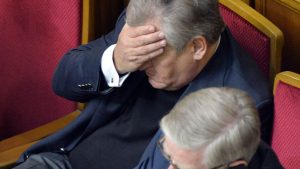
However, such protests occur everywhere and all the time... even in modern Russia. However, not everywhere do they become so powerful, dramatic and successful as in Ukraine (despite the Russian occupation of Crimea in Match 2014).
Why did Maidan 2013-2014 win? The first sign was Putin’s hysterical reaction when his troops invaded and occupied Crimea. Some say that that it was not a war, but a simple intervention. No, wars can be different. Russia waged a cyber war with tiny Estonia in 2007, a “real” war in Georgia in 2008, and has led a creeping war of destabilization in Ukraine since 2014.
makes sense, and the world of revenge and violence - il fine giustifica i mezzi (the end justifies the means).
Not only did Maidan become the heart of a modern Ukrainian political nation, but also a test for the whole world… and this is not just some literary metaphor!
The future world order will be determined by global reaction to Putin’s provocation. Either the US and EU agree to this and fail to confront Putin on major issues and not just impose decorative sanctions against selected Russian personalities or they will raise the glove – “accepter un défi pour un duel”.
Maidan has raised important issues related to geopolitics. Many Western politicians have tried to dismiss what they know and who they are dealing with. We point to the “collective Putin”, i.e. revanchist forces that have taken root mainly in Russia. It is enough just watching the almost erotic ecstasy - stylized as in the Third Reich or North Korea - in the Kremlin when Putin delivers his triumphant messages. Putin is not alone… neither was Hitler. We deal with revanchism that has seized millions of Russians. But, revanchism is a contagious disease.
Today (March 2014), many citizens of Crimea have become revanchists. I do not want to remind them about the fate of Sudeten Germans. Anyway, none or almost none of them will read this article. I also do not want to make it look like a threat. Crimea has merely plunged into the past - the soviet past – and gone against the tide of history. Well, Crimeans will have to go through it again when Putin and his regime collapse and, God forbid, accompany Russia in its disintegration. Hopefully without us…
At the beginning of the article I listed the old European nations that created old empires; they also enthusiastically rushed to cut up and redistribute the map of the world - from Galicia to Samoa. And how did it all end? They disintegrated… I do not wish to end this article with “prophetic judgments” like “truth will prevail” or “evil shall be defeated”. Maybe this will happen in the future, but will we live to see it? No one knows. The people who were burned in the Majdanek concentration camp did not know that Nazi evil would be defeated. Survival was what mattered to them, a potato peel hurriedly swallowed while squatting over the cesspool. Please excuse my blunt and ungracious words! I know this firsthand from an ex-inmate imprisoned in the Solovki Gulag concentration camp in the thirties who tried to educate me. So, this is also not a metaphor.
In the meantime, we must «accepter un défi pour un duel». In any case, the challenge was picked up by the Maidan. It was not the first time and it will not be the last. Maidan is ready to take up the challenge yet again, like much of Ukraine. Not everyone because not everyone is ready yet… and these people may never be ready. This happens… And then these individuals - because it is difficult to define them as part of a nation - just drop out of history and become mere inhabitants of a defined region.
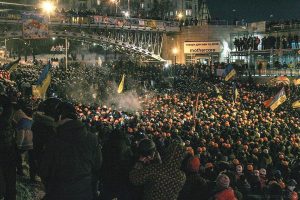
Not only should Ukrainians, who created history on Maidan, not disappear from world history, but neither should the Europeans and Americans. There is no doubt that the 2013-2014 Maidan made history, a history that was created and developed more actively than in Vienna or Copenhagen during those inspiring but tragic winter months of 2014. And yet, this history was created for Vienna and Copenhagen although they were not aware of it and still seem unaware. After all, they were not too concerned when the Nazis occupied Sudetenland in Czechoslovakia in 1938, followed closely by Belgrade and Oslo because they were far away. They turned out to be very close…
Maidan became a small keyhole through which we can look into the future, not only Ukraine’s future, but the future of the world. Considering the events of Maidan, we must draw the right conclusions and act accordingly. The future remains the future, and it is not doomed. We can arrange and manage everything any way we want, but we must want it. We must want to change the world, but for the better. That is what Maidan activists dreamt during those long cold and sleepless nights on Independence Square in Kyiv (Maidan Nezalezhnosty)… not only a new world for Ukraine, but also for Europe.


